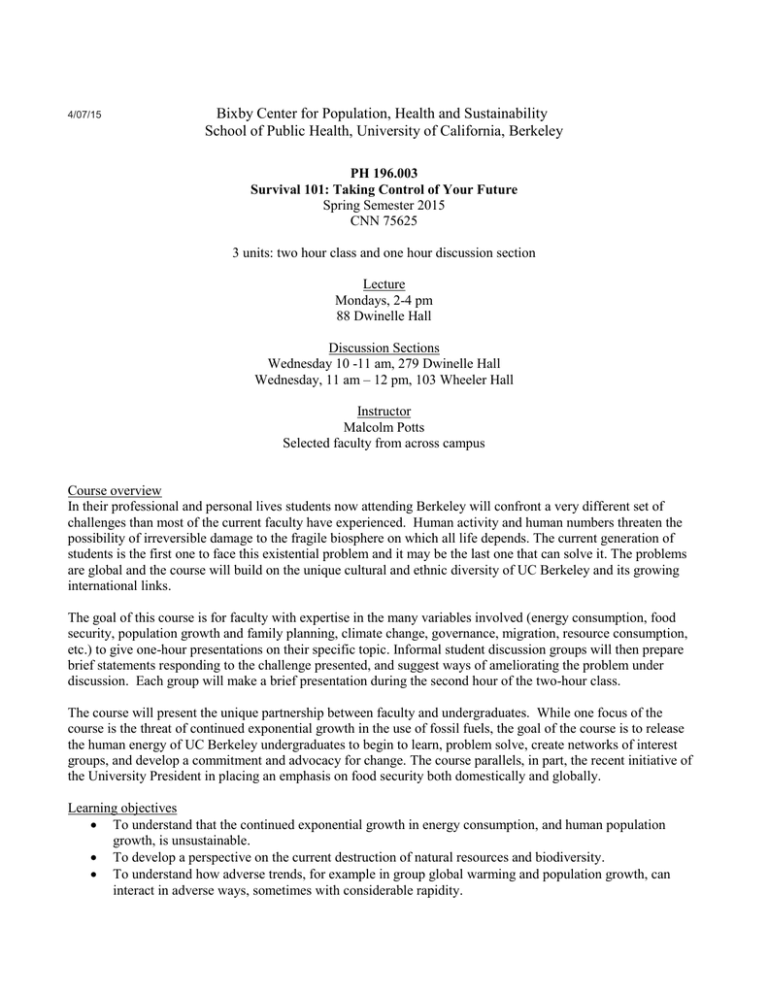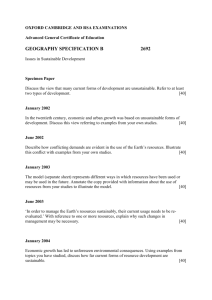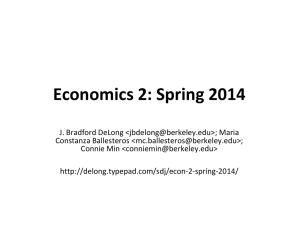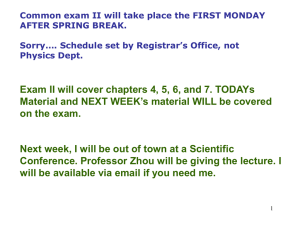Syllabus - The Bixby Center for Population, Health, and Sustainability
advertisement

4/07/15 Bixby Center for Population, Health and Sustainability School of Public Health, University of California, Berkeley PH 196.003 Survival 101: Taking Control of Your Future Spring Semester 2015 CNN 75625 3 units: two hour class and one hour discussion section Lecture Mondays, 2-4 pm 88 Dwinelle Hall Discussion Sections Wednesday 10 -11 am, 279 Dwinelle Hall Wednesday, 11 am – 12 pm, 103 Wheeler Hall Instructor Malcolm Potts Selected faculty from across campus Course overview In their professional and personal lives students now attending Berkeley will confront a very different set of challenges than most of the current faculty have experienced. Human activity and human numbers threaten the possibility of irreversible damage to the fragile biosphere on which all life depends. The current generation of students is the first one to face this existential problem and it may be the last one that can solve it. The problems are global and the course will build on the unique cultural and ethnic diversity of UC Berkeley and its growing international links. The goal of this course is for faculty with expertise in the many variables involved (energy consumption, food security, population growth and family planning, climate change, governance, migration, resource consumption, etc.) to give one-hour presentations on their specific topic. Informal student discussion groups will then prepare brief statements responding to the challenge presented, and suggest ways of ameliorating the problem under discussion. Each group will make a brief presentation during the second hour of the two-hour class. The course will present the unique partnership between faculty and undergraduates. While one focus of the course is the threat of continued exponential growth in the use of fossil fuels, the goal of the course is to release the human energy of UC Berkeley undergraduates to begin to learn, problem solve, create networks of interest groups, and develop a commitment and advocacy for change. The course parallels, in part, the recent initiative of the University President in placing an emphasis on food security both domestically and globally. Learning objectives To understand that the continued exponential growth in energy consumption, and human population growth, is unsustainable. To develop a perspective on the current destruction of natural resources and biodiversity. To understand how adverse trends, for example in group global warming and population growth, can interact in adverse ways, sometimes with considerable rapidity. To define, through discussion and readings, those policies that need to be put in place and the investments that must be made in order to move the current pattern of unsustainable economic activity to a biologically sustainable one. To understand, by building on the ethnic and cultural diversity of UC Berkeley, the many political, social, and cultural barriers that stand in the way of developing needed ,evidence-based policies and investments. Grading 20% Short reflection paper (4 pages, double-spaced) on your perceptions of one of the topic areas covered in the course. Minimum of three outside sources. 35% Participation in discussion section. 20% Second reflection paper (6 pages, double-spaced) using acquired knowledge for in-depth analysis of first reflection paper topic to include proposed, achievable solutions. Minimum of three outside sources. 25% Capstone presentations. Short reflection paper turned in during class on 2/23. Second reflection paper turned in during class on 4/20. More information on the reflection papers and capstone presentations will be provided in discussion sections. This is a small class and your attendance and participation are important! If you need to miss a class for a valid reason you must inform the GSI ahead of time to be excused. Without a valid excuse your final grade will be reduced by 5% if you are absent from lecture; and your discussion section grade percentage will be reduced by 5% if you are absent from discussion section. (One goal of the pilot course will be to test the possibility of a unique grading mechanism. This could involve discussion sections making presentations to the rest of the class who will then use their iClickers to grade the (i) relevance and (ii) achievability of the response to the specific problem presented in the previous week by faculty.) Attendance iClickers will be used in the lectures and also to validate attendance. You can buy your iClicker remote at the Cal Bookstore. Please use iClicker+. You must register your iClicker within the PH196.003 bCourses course site using the tool in the left-hand navigation bar. Each student must have his or her own iClicker. Sharing is not allowed. It is imperative that you do not give your iClicker to anyone if you will be absent or do not accept someone else’s iClicker. Readings Students are required to read the assigned articles posted on the class bCourses and available as a reader at Krishna Copy, 2111 University Ave. In addition, selected readings will be assigned from The Crash Course: The Unsustainable Future of Our Economy, Energy, and Environment on reserve in the SPH library. Course contact information: Instructor of Record Malcolm Potts MD PhD 207G University Hall tel. 642-4327 potts@berkeley.edu GSI Maggie Crosby MPH Candidate ’15 maggie.crosby@berkeley.edu Course Coordinator Claire Norris MPA 227 University Hall tel. 642-6915 cnorris@berkeley.edu COURSE OUTLINE 1. 1/26 Introduction of the Course (Malcolm Potts) The goals of the pilot course and how they will help develop a larger course of 200-500 students. Scale and exponential growth. Will the next twenty years be fundamentally different from the past twenty years? If yes, this is the course for you. Reading: Martenson, Chris, The Crash Course: The Unsustainable Future of Our Economy, Energy, and Environment, John Wiley & Sons, Inc. 2011, Chapter 1,The Coming Storm, pages 3-6 2. 2/02 Population and Family Planning (Ndola Prata) Reading: Prata, Ndola, Making Family Planning Accessible in Resource-Poor Settings, Philosophical Transaction of the Royal Society B (2009) 364, 3093-3099 Potts, Malcolm, Getting Family Planning and Population Back on Track, Global Health: Science and Practice, 2014, Volume 2, Number 2 Discussion: Innovative video production for capstone presentations. Bring your computers with iMovie to class to follow along. Taught by Lisa Peterson. 3. 2/09 Human Causes of Recent and Future Climate Change (Michael Wehner) Reading: Walsh, John, Wuebbles, Donald, et al, US Global Change Research Program, Climate Change Impacts in the United States, Chapter 2, pages 1-29 Walsh, John, Wuebbles, Donald, et al, US Global Change Research Program, Climate Change Impacts in the United States, Appendix 4, FAQ, pages 1-31 Discussion: Discuss and present possible solutions on population and family planning (February 2 lecture). 2/16 Presidents Day Holiday 4. 2/23 The Transition to the Bio-economy (David Zilberman) DUE: Short reflection paper Reading: Zilberman, David, The Economics of Sustainable Development, The American Journal of Agricultural Economics, 96, no.2, 2014: 385-396 Swinnen, Johan, Riera Oliva, The Global Bio-Economy, Agricultural Economics 44, no. s1, 2013, 1-5 Martenson, Chris, The Crash Course: The Unsustainable Future of Our Economy, Energy, and Environment, John Wiley & Sons, Inc. 2011, Chapter 17, Necessary But Insufficient: Coal, Nuclear, and Alternatives, Minerals, pages 159-176 Discussion: Discuss and present possible solutions on climate change (February 9 lecture). 5. 3/02 Environment and Agriculture, Food Security (Federico Castillo) *Lecture from 3-4 pm Reading: An Introduction to the Basic Concepts of Food Security, Food Security Information for Action Practical Guides, The EC-FAO Security Programme Roncoli, Carla, Okoba, Barrack, et al, Adaptation to Climate Change for Smallholder Agriculture in Kenya: Community-Based Perspectives from Five Districts, Kenya Smallholder Climate Change Adaptation, October 2010, The University of Georgia Reardon, Thomas, Nosti Stephen, Links Between Rural Poverty and the Environment in Developing Countries: Asset Categories and Investment Poverty, World Development, Vol. 23, No. 9, 1995, pages 1495-1506 Martenson, Chris, The Crash Course: The Unsustainable Future of Our Economy, Energy, and Environment, John Wiley & Sons, Inc. 2011, Chapter 20, Soil: Thin, Thinner, Gone, pages 197-203 Discussion: Discuss and present possible solutions on the bio-economy (February 23 lecture). 6. 3/09 Issues in Contemporary Climate Change Research (Michael Wehner) Reading: no assigned readings for this lecture Discussion: Discuss and present possible solutions on the environment and agriculture (March 2 lecture). 7. 3/16 Mid-Course Corrections (Malcolm Potts) Discussion on where the pilot course is going, how it can be improved, and any ideas from students and faculty for new topics or content. 3/23 Spring Break 8. 3/30 What is Wealth? (Chris Martenson) Reading: Martenson, Chris, The Crash Course: The Unsustainable Future of Our Economy, Energy, and Environment, John Wiley & Sons, Inc. 2011, Chapter 9, What is Wealth? (Hint: It’s Not Money), pages 57-62 Discussion: Discuss and present possible solutions on climate change (March 9 lecture). 9. 4/06 Economic Impact of Climate Change (Maximilian Aufhammer) Reading: Martenson, Chris, The Crash Course: The Unsustainable Future of Our Economy, Energy, and Environment, John Wiley & Sons, Inc. 2011, Chapter 25, Future Scenarios, pages 231-245 Discussion: Discuss and present possible solutions on wealth (March 30 lecture). 10. 4/13 Global Migration and Demographic Change (Robin Marsh) Reading: Kapur, Devish, McHale, John, The Global Migration of Talent: What Does it Mean for Developing Countries?, CGD Brief, Center for Global Development, October, 2005 Cohen, Joel, Beyond Population: Everyone Counts in Development, Working Paper 220, July 2010, Center for Global Development Discussion: Discuss and present possible solutions on economic impact of climate change (April 6 lecture). 11. 4/20 Flipped Class – students reach about oceans DUE: Second reflection paper Discussion: Discuss and present possible solutions on global migration (April 13 lecture). 12. 4/27 Synthesis Lecture: Viewing the Human Dilemma Systemically (John Harte) A look at all the lecture issues presented and discussion on the merits of viewing the human dilemma systematically. Examination of the positive and negative synergies among components and the types of solutions that properly respect the entanglements within the system. Reading: Harte, John, Feedbacks, thresholds and synergies in global change: population as a dynamic factor, Biodiversity and Conservation 5, 1069-1083 (1996) Martenson, Chris, The Crash Course: The Unsustainable Future of Our Economy, Energy, and Environment, John Wiley & Sons, Inc. 2011, Chapter 19 Minerals: Gone with the Wind, pages 191-196 Discussion: Discuss and present possible solutions on April 20 lecture. 13. 5/04 Capstone Presentations / Course Evaluations Students will select the two best ideas from the course and each will be addressed in a 30-45 minute presentation to the class. Students will choose from creative formats in addition to PowerPoints – e.g. videos, scientific posters, debates, TED Talks, etc.




